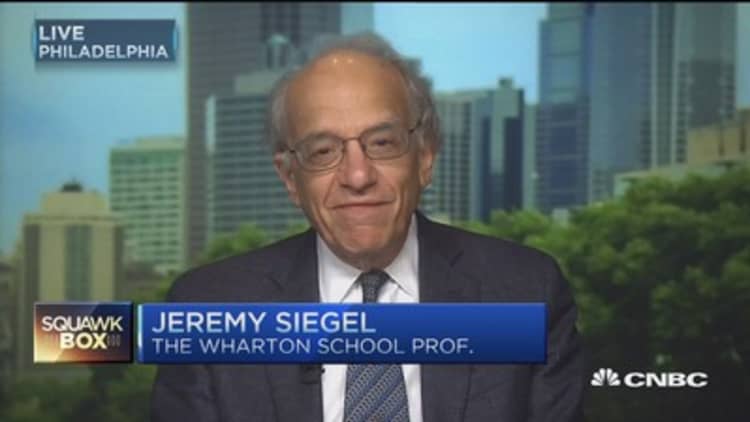
Consummate stock market bull Jeremy Siegel is feeling particularly good about the fourth quarter, and it has everything to do with the Federal Reserve's expected interest rate hike.
"If they go in September, I think the fourth quarter might be the very best quarter for stocks this entire year," the Wharton School finance professor said on Tuesday on CNBC's "Squawk Box."
The reason: Investors are being told to hold off on buying stocks before the Fed raises rates, a strategy with which Siegel takes issue.
"When they raise a quarter percent and see the world does not end, they'll say, 'You know what? This wasn't so bad after all,'" he said. "So I think the anticipation of the raising rates is worse than the actual act of raising rates."
The Federal Reserve has held its benchmark interest rate near zero since December 2008. The central bank is widely expected to raise rates in 25-basis-point increments, though the timing and pace of the eventual hike remains uncertain.
Read More Why June could be a turning point for markets
While stocks are selling "a little rich" compared to historical averages in terms of price-to-earnings ratios, the low interest rate environment makes equities look more affordable, Siegel said. Even after the Fed's liftoff, he expects rates to remain very low through 2016 and 2017, and relatively suppressed for the next decade.
In such an environment, multiples of 18 to 19 times earnings are not excessive, he said.
Markets will certainly see a correction in the next decade, Siegel added, but he believes earnings ratios will vacillate between 15 and 20 times earnings, versus the historical post-WWII range of 12 and 17.
Some market watchers worry the Fed could lose control of the pace at which interest rates rise as investors make bets on the trajectory of yields. That could lead rates to rise faster than the central bank prefers.
Read More Fed may be audience, not actor in rate hike: Portfolio Manager
As for the S&P 500 technology sector, Siegel does not currently see signs of a bubble, and said the space looks undervalued compared to the broader index. However, he said valuations in the private market could run up as the high cost of regulations make it less attractive for tech start-ups to embark on initial public offerings.
"The broader question I see is 'Are regulations making it difficult for firms to go public in terms of the cost?'" he said. "They'd rather be bought by someone else or stay private."


